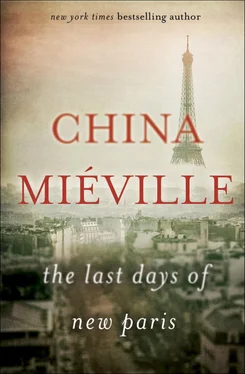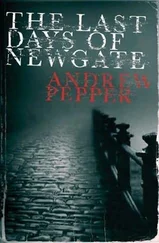Thibaut grants Sam’s memory a moment. He wishes her something. I have a mission, he thinks. The mission. Start from scratch, redo history, make it mine. A new book.
He puts her notebook and her films in her bag. Thibaut shoves it deep into a hole in the brick of the barricade. The limits of the zone. He makes her records, the evidence of treachery and machinations, secret plans, spells and dissenting art, part of the substance of the edge. For someone to find.
The sun picks out the edges of the affected part, the crumble where there was destruction. He waits until he sees bats in the sky. Then, bruised and tired, triumphant and unsure, Thibaut takes a deep breath and steps over the boundary, back into New Paris, the old city.
AFTERWORD
On Coming to Write
The Last Days of New Paris
In the autumn of 2012 my publishers forwarded me a handwritten message. It was from someone of whom I hadn’t thought for many years. I’d known her slightly when we were both students at the same institution, though we’d been in different departments. It was close to two decades since we’d spoken. At first I didn’t even recognize her name.
Some online searching reminded me, and filled in blanks. When I’d known her she’d been studying art history, and it seemed that she’d gone on to teach the subject at universities in Europe, specializing in modernism. In the late ’90s, so far as I could ascertain, she’d gained a small degree of notoriety by putting on a short series of collaborations with scientists and philosophers, something between performances and avant-garde provocations, with titles like “Not River but Estuary: Steering Aurelius Upstream(s)” and “What’s Once and What Wasn’t Is Still.” I could find no details or descriptions of any of these events.
Around 2002 her online trail dried up. She seemed to disappear. Until she wrote to me.
Her message was terse. She’d read an essay I’d written some time previously that touched on Surrealism, and it had reminded her of my interest in the movement. On that basis, she said, she was contacting me on behalf of someone who very much wanted to meet me, and to whom, in turn, she was certain I’d find it interesting to speak. But there was, she said, a very limited window of possibility, “some doors opening only occasionally and briefly.”
She gave the name of a hotel in Farringdon, a room number, a date, and time (less than two weeks away), told me to bring a notebook, and that was all.
I’m not certain why I chose not to ignore the message. Curiosity, mainly, I think—I’ve received a fair number of eccentric invitations over the years, but none with this sense of vaguely aggressive urgency. In any case, after hemming and hawing, rather surprised at myself, resolved to walk away the instant I was made uncomfortable, I made my way to the—faded but not depressing—hotel. I knocked at the given door, at the given time.
To my surprise it was not my correspondent who opened it but an elderly man. He stood aside for me to enter.
He was well into his eighties, but he stood very straight. He still had half a head of hair, and it was not all gray. He was lean and still strong looking, in clean, faded and battered clothes in a very outdated style. He never lost his expression of suspicion, throughout the hours I was with him.
I asked after my acquaintance and the man shook his head impatiently and answered in growling French, “Ç’est seulement nous deux.” It was just we two.
My French is bad, but much better passive, listening, than speaking, which turned out to be just as well.
I introduced myself and he nodded and rather pointedly did not reciprocate.
He indicated me to sit in the room’s only chair, moving his bag from it. I hesitated to do so because of his age but he motioned again, impatiently, so I obeyed, and for most of the hours that followed he remained standing, sometimes pacing, sometimes shifting his weight a little from leg to leg, never losing his restlessness or energy. When he did sit, it was on the very edge of the made-up bed, and rarely for long.
He told me he understood I was a writer, and that I was interested in Surrealism and in radical politics, and that on that basis he had a story to tell me. I allowed that I was, but cautioned that I was by no means a specialist in the history of the movement. I told him that there were many people more expert than I, and that perhaps he and my acquaintance should seek out one of them.
The man gave one of what was to be his rare wintery smiles.
“Elle a déjà essayé,” he said. She had tried already. I was, he said, the fourth person she had contacted, in an increasing hurry as, according to that unclear schedule, time grew short. He let that sit a moment. So I was the best that she could come up with, and now it was my job to listen, to take notes, and ultimately to do with what he told me whatever I thought best.
He waited while I organized myself, got my pen and paper ready. I brought out my phone to record but he shook his head so I put it away again. He seemed to chop the air in front of me with his hands, organizing his thoughts.
“Your Paris,” he began, “is old Paris. In New Paris, things were different. There was a man in New Paris. He was looking down. It was night. Beyond a wall of ripped-up city, Nazis were shooting.”
Thus began thirty-nine extraordinary, indeed—the adjective isn’t hyperbolic—life-changing hours. Over their course, uninterrupted by sleep, growing more and more bleary and vague, fortified by crisps and chocolate and water and a nasty wine from the mini-bar, the man told me the last days of New Paris, the story that I have presented here.
He spoke in passé simple and imparfait: he was never other than ambiguous about whether what he was telling me was a story, though his explanations of the city’s quiddity, of its history, his descriptions of the streets and landscapes of New Paris, were completely vivid. At times he would hesitate and take my notebook from me and scribble an illustration of what he was describing. I still have them. He was no artist, but sometimes it helped me visualize. And very often it would provoke a memory in me, of some other image or poem or passage, and I would take it from him and draw myself, asking him, “Is this right? Did it look like this?” Sometimes much later I would go back to my own books, looking for a source I thought I could recall. Here I’ve reproduced those of my sketches that he implied were most accurate.
On three occasions during our time together, he brought out some notebooks of his own. Battered, ancient, blood- and dirt- and ink-stained things. He would not let me read them in their entirety, but he would show me certain sections, certain dated entries in scrawled French, and let me copy out phrases or even other sketches of what he documented (those last he clearly had not drawn himself).
The man was an utterly compelling storyteller, but a disorganized one. I was captivated and adrift. He spoke with concentration and without hesitation, but—clearly feeling under immense pressure of time—he went too fast, and my notes, made in translation, would falter. He told events out of order. He doubled back on himself to fill in details he realized he had missed. Sometimes he would contradict himself, or veer between historical speculation and seeming certainty. He could be sidetracked and go off on a rumination or explanation of some detail of New Paris that, while rarely anything other than fascinating, was only tangentially related to the story he was telling.
About New Paris itself, he never spoke with anything other than the most wrenching, oneiric specificity. In his descriptions of the time before the S-Blast, of Marseille, of the Villa Air-Bel, he used a different register. Then he was recounting something told to him, something reconstructed, the result of investigations—investigations unfinished and full of holes, that I, dutifully, with much research, would later do my best to fill.
Читать дальше












